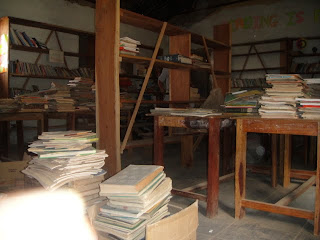It gives me hours of angst and torment; well okay a few moments consideration, as to what to write. Each moment brings a new event or experience, high or low, and it is impossible to record them all. We are now in Janjnabureh, ensconced in our lovely small dwelling with the nicest, kindest and thoughtful landlord one could wish for. We’ve been to the offices and met many many people, with warm smiles, firm handshakes and open generosity. We’ve walked around the town, chatted to old and young alike, sat on stone steps to pass the time of day with retired teachers, workmen and ‘the youths’. We have our Gambian names, given to all volunteers, so I am now Hawa (rhymes with power) Darbo and Pete goes by the name of Bakary Darbo. We live in Darbokunda. Mandinka greetings have become almost natural on the lips followed by blind panic as conversation continues. Visitors for dinner, coffee, cold water or just a chat are a daily occurrence. We’ve been here three days.
So here I am, another three days past, and as far out of my comfort zone as I could ever have imagined. This morning Bakary and I sauntered down to the office, with many Salam’s and smiles and handshakes to meet Touray and Andrew. We were wondering with excited anticipation if we might actually make it to a school and see some of those delightful, chatty, forthright children that we meet as they play in the mud and dust. ‘Trek today’ ‘Right’ ‘Bakary south bank, Hawa North’. Fifteen minutes to scrabble about, bemoaning the lack of washed clothes, have we got two tubes of toothpaste? hooting car, got to go, swift kiss goodbye. ‘See you Friday’ and off on yet another adventure.
My team had to wait a while for the ferry crossing, not for the faint hearted reverser of cars as they are packed like sardines, as the Minister of Tourism was about to arrive on the Island amid drums and multicoloured fashionable Africans. Met the governor, the immaculately dressed imam, and onto the boat in blazing sunshine reflecting off the river in silver ripples. Lush, smooth, tarmac road for a full five minutes and then turn right onto the track. Not even the driver was sure of the route, doing as all good navigators do, using the previous tyre marks to lead the way. Through the scraggy bush land, some burnt by hunters, over pelvic floor exercise inducing potholes and bumps we made it to the first school.
A vast gravel stone area was fenced with sticks and wire. The headmaster’s office/classroom was part of a terrace, palm leaved roof and stick walls. Six classrooms, all about ten-foot square, were filled with seats made of half logs mounted on shorter stubbier ones. No desks, no space for movement, 45 children per class. The only décor, a blackboard with numerous multiplication sums far too advanced for the poor scraps trying to complete them. For those children with books the only marking said ‘poor’ or ‘weak’. My role for the week is one of inspector. Oh the dread and fear the very word invokes in me.
The huge headmaster with no prior notice of our arrival was welcoming but his soulful face was near to tears as we asked for registers, teaching plans and timetables. I could bear it no more and moved to the classrooms, avoiding those with whole class repetition and heading for the most cheerful. My white-faced presence caused a stir, either fear or curiosity, child temperament depending. Some were pleased to show me their books of neat handwriting, which they could read uncomprehendingly. Others tried to fade into the background. Children’s work and teaching charts skewered precariously onto the stickwalls showed the teacher was trying hard to engage and educate.
The only brick building was that of the kitchen. The world food programme is big and essential here as many children are woefully malnourished, rickets and deformity abounds. Sadly no food was being cooked as ‘the school we’re only three years old’ and no one has filled in the form to register. Gambian time and initiative are unhappily slow.
I could go on and on. The second school was totally different. By the time we got to the third the school day was finished so we sat and drank attaya and chatted and passed the time of day and bemoaned Gambian time and how much there is to do, then ate ‘foodbowl’ which was, tonight, the most disgusting mixture of rice smoked fish and green slime. Now I’m here, in bed, surrounded by ants and cockroaches, Pete miles away phone out of charge, head torch firmly fixed, sticky with sweat and DEET, hand invisibility darkness, towel for a sheet on a concrete mattress and happy as the proverbial sand boy. (Even though I would jump at the chance of a warm soapy shower, a decent cup of tea with skimmed milk, a flushing clean toilet……………..)













